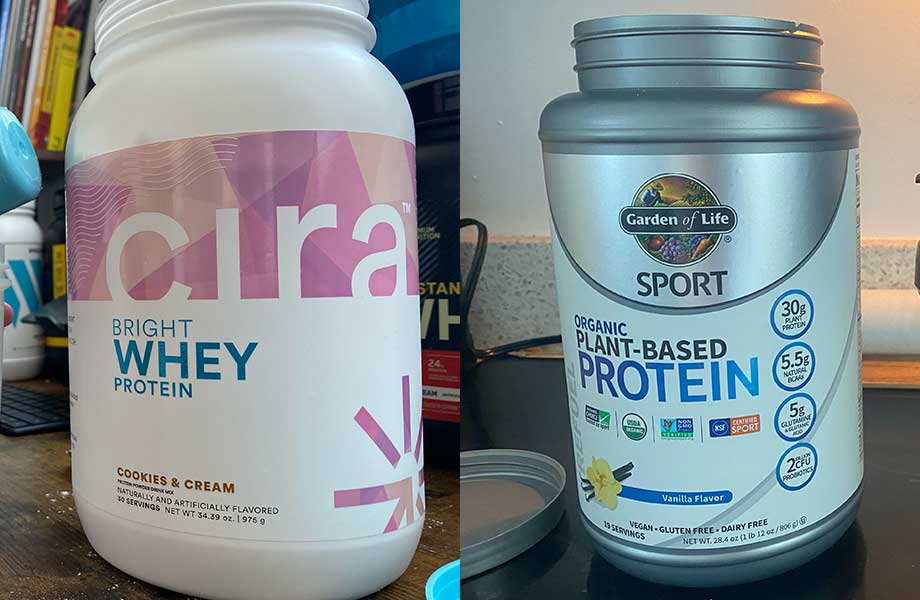We test and review fitness products based on an independent, multi-point methodology. If you use our links to purchase something, we may earn a commission. Read our disclosures.
If you have specific fitness and health goals, you’ve probably considered using protein powder to help you meet them. The benefits of protein powder are well known, but comparing plant-based protein powders on your own can leave you scratching your head.
Plant-based protein and whey are both popular options, but you may not be sure whether they’re equally effective or which to choose. Sometimes you don’t know what you don’t know, and that’s OK. I’ll discuss plant-based protein powder vs whey in detail so you can make the best decision when choosing between these two products.
Medical disclaimer: This article is intended for educational and informational purposes only. It is not intended as a substitute for medical advice. For health advice, contact a licensed healthcare provider. GGR also recommends choosing a product that has been third-party tested for quality.
What Is Plant-Based Protein?
Plant-based protein powders are dietary supplements used by flexitarians, vegans, and people following a plant-based diet to improve their protein intake.
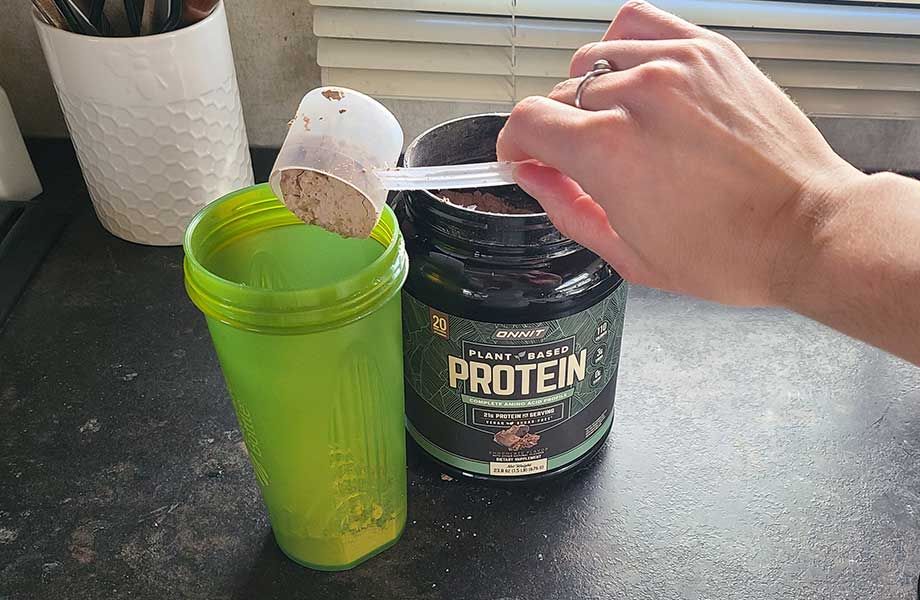
The term “plant-based protein” is a bit vague on its own, as proteins can be extracted from many different plants. Some of the most commonly used plant sources include soy, yellow peas, hemp hearts, brown rice, peanuts, and chia seeds.
RELATED: Best Hemp Protein Powder
What Is Whey Protein?
Whey is one of the primary proteins in milk and is a major byproduct of cheesemaking. Leftover whey is frequently processed into whey protein powder, one of the most popular animal-based protein supplements on the market. Whey protein is easy to find and is available in a seemingly unlimited variety of flavors.
RELATED: What Is Whey Protein?
Benefits of Plant-Based Protein
The performance and health benefits of plant-based protein are still being studied, but are pretty impressive so far. Plant-based protein powder:
Helps Increase Protein Intake
If you’re very physically active, are an older adult, are recovering from surgery, or are trying to lose body fat while maintaining muscle mass in a calorie deficit, you’ll likely benefit from eating more protein. Protein powders are best used to supplement an already healthy diet, giving you a helpful protein boost without taking the place of whole protein foods.
Protein powders are quick and convenient, making them a great solution for hectic schedules. When added to smoothies and protein shakes, they’re also a helpful way to get more calories and protein when your appetite is poor.
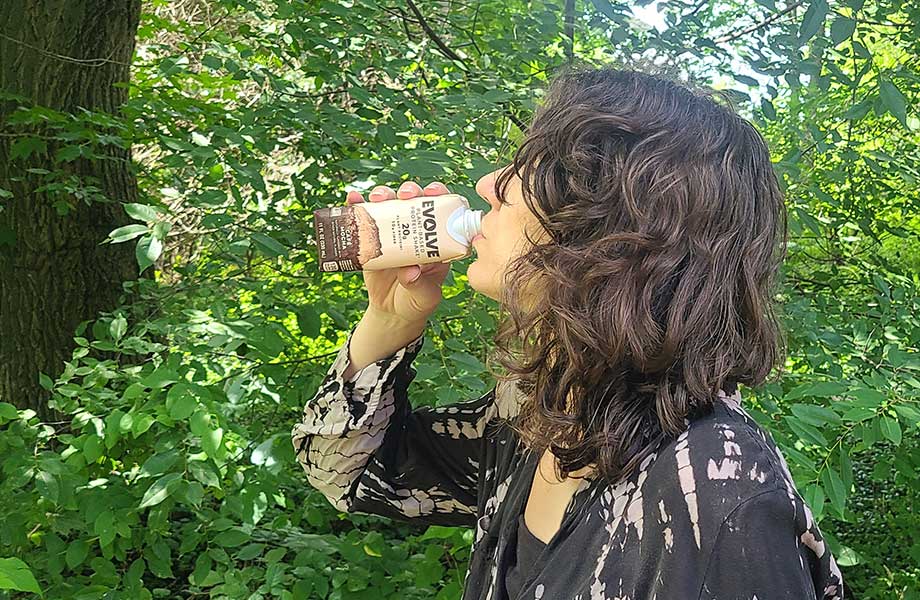
Helps Build Muscle and Improves Strength
There’s a reason why protein powders are so popular among gym rats—they’re really effective! Higher protein intakes up to 1.6 grams per kilogram of body weight per day significantly improve muscle strength and size when combined with resistance training, according to a March 2018 meta-analysis in the British Journal of Sports Medicine1.
Additionally, getting enough protein can also help with post-workout muscle recovery.
RELATED: Best Muscle Recovery Supplements
Increases Satiety
Protein makes meals more filling and reduces excessive cravings, helping improve the nutrient density of your diet. Adding more plant-based protein throughout the day is a helpful strategy for feeling full and satisfied during periods of weight loss and can help prevent feelings of restriction.
Can Improve Heart Health
Soy protein in particular is great for the heart. According to a January 2021 review in the International Journal of Molecular Science2, consuming soy protein was shown to reduce total cholesterol, LDL cholesterol, and triglycerides in healthy people and people with high cholesterol, Type 2 diabetes, and obesity.
Benefits of Whey Protein
Whey protein provides many of the same benefits as plant-based protein for muscle growth and strength, satiety, improving protein intake, and convenience. It’s been the most well-studied source of protein for building muscle and improving performance, making it the gold standard in protein supplements.
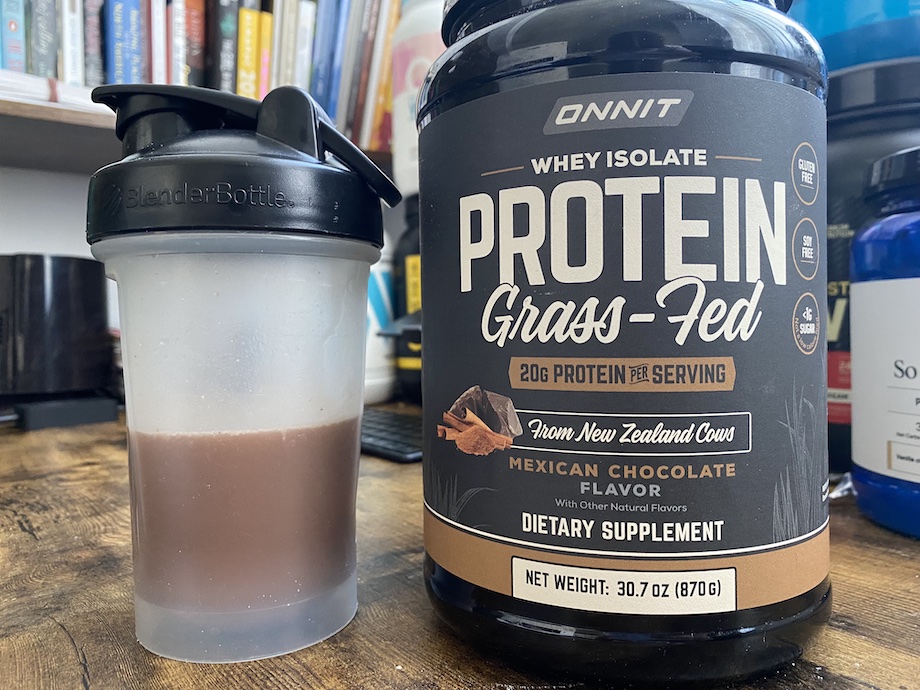
RELATED: Best Whey Protein
Like soy protein, whey protein helps reduce cholesterol levels3, triglycerides, fasting glucose, and insulin insensitivity, potentially reducing the risk for metabolic syndrome, Type 2 diabetes, and cardiovascular disease.
Additionally, whey protein is a complete protein, meaning it contains all nine essential amino acids in optimal proportions required by the body to function at its best. It’s high in all three branched-chain amino acids (BCAAs), making it particularly effective for stimulating muscle protein synthesis.
Some plant-based proteins are also complete proteins, but contain a lower proportion of certain BCAAs. Soy, for example, is very similar to whey in its amino acid profile, while hemp (another technically complete protein) is quite a bit lower in leucine, meaning you may have to consume more of it to get the same benefits.
Plant-Based Protein Powder vs Whey: Comparison
Let’s take a look at how plant-based protein and whey protein compare in the following areas.
How They Are Manufactured
The manufacturing process for plant-based and whey protein powders are quite different, as we’ll see below.
Plant-Based Protein
The production process for plant-based proteins varies based on the type of plant used as the protein source, but the general process for manufacturing plant-based protein powders includes:
- Washing and drying the plant source
- Removing husks and tough outer shells
- Pressing high-fat foods (like hemp seeds) to remove most of the oil
- Grinding the pressed mixture into a flour
- Removing most of the carbohydrates to produce protein concentrates
- Further filtering of protein concentrates, removal of dietary fiber via centrifugation, and drying to produce protein isolates
Whey Protein
The process of making whey protein begins with cow’s milk. To make cheese, the enzyme rennet is added to pasteurized milk to separate the solid curds (cheese) from the liquid portion rich in whey. This liquid is filtered to remove much of the fat and carbohydrates, producing whey protein concentrate.
Whey protein concentrate can be filtered again to remove even more fat and carbohydrates, which produces whey protein isolate. Isolates contain over 90% protein, while protein concentrates can contain anywhere between 35% to 90% protein.
RELATED: Whey Protein Isolate vs Concentrate
Amount of Protein
On average, a serving of whey protein powder contains between 21 to 30 grams of protein. This amount can vary based on whether whey protein concentrate or whey protein isolate is used, with the latter being higher in protein. This means that the recommended serving size for whey protein concentrate will be a little larger than for whey protein isolate.
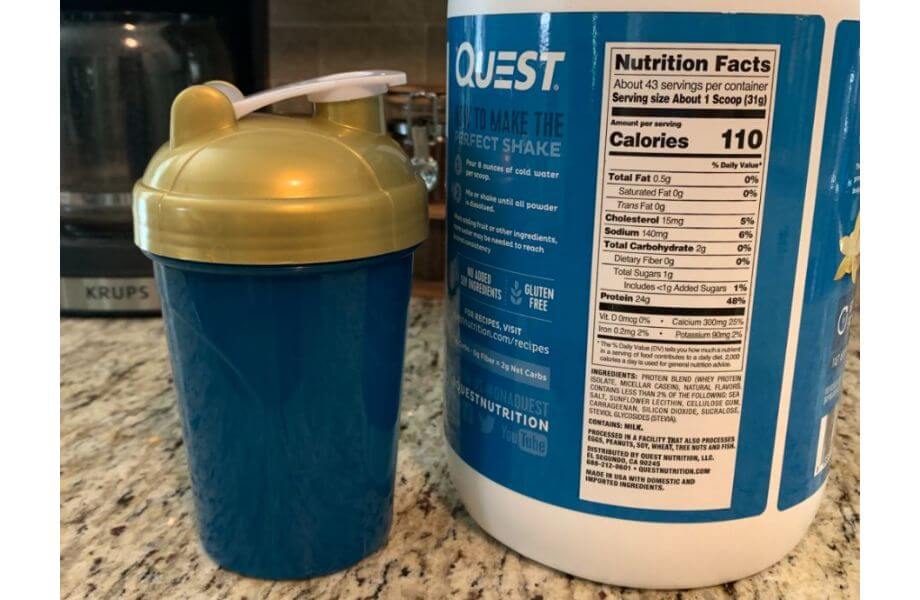
Plant-based protein powders are similar, with most containing anywhere from 18 to 30 grams of protein per serving.
Of course, protein content also varies by brand and product, so you should always check the label for the most accurate numbers.
RELATED: Best Vegan Protein Powder
Ingredients
Many of the best protein powders have added ingredients. “Pure” whey and plant-based protein powders are available, but many contain additional ingredients to improve the flavor, appearance, nutrition profile, and consistency of the product.
Sugar, artificial sweeteners, sugar alcohols, and “natural” zero-calorie sweeteners like stevia are often used to sweeten different types of protein powders. Natural and artificial flavors are also common.
For a creamier or thicker consistency, fats or emulsifiers like soy lecithin or xanthan gum may be added.
With plant-based protein powders, you’ll often find blends of different proteins in products made with incomplete proteins. Incomplete proteins are slightly lower in at least one of the nine essential amino acids, so other proteins higher in those amino acids are often added to ensure a complete protein profile.
Pea protein powder, for example, is slightly lower in methionine and higher in lysine. To make the amino acid profile more balanced, brown rice protein (higher in methionine and lower in lysine) is often added.
RELATED: Pea Protein vs Whey
Solubility
A big plus for any protein powder is how well it dissolves in water. Whey protein is generally more soluble4 than plant-based proteins, but this varies based on the type of plant-based protein and the way in which they’re manufactured.
For example, plant-based proteins such as pea and sunflower that are high in globulins and albumins (two types of storage proteins) are more soluble than wheat or rice, which are higher in other types of storage proteins.
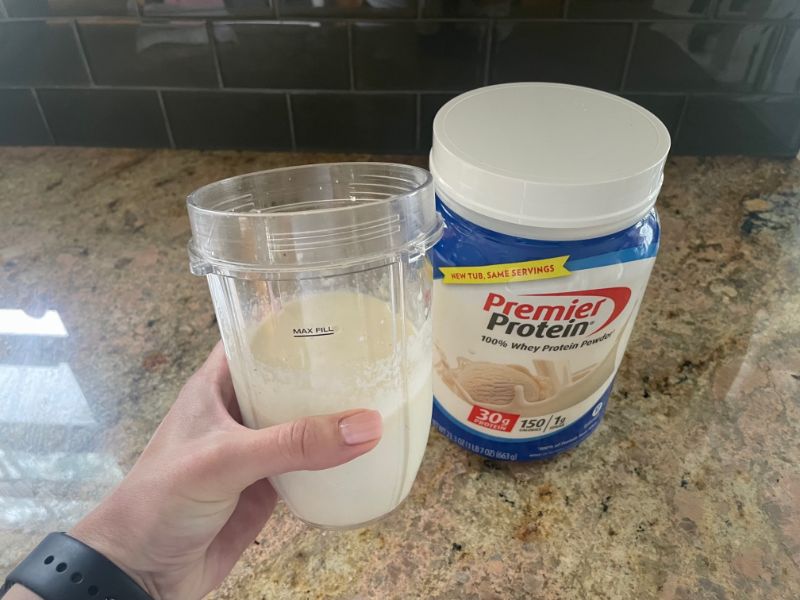
Mixability
Sometimes it seems like clumpy protein shakes are an inescapable fact of life. Both whey and plant-based protein powders have the potential to clump up when mixed with liquid.
Clumping potential is higher with whey protein concentrates than isolates since they’re higher in carbohydrates and fats that don’t mix well with water. Similarly, many plant-based proteins (especially those made from legumes like soy and peas) contain carbohydrates and fiber, reducing their mixability.
To choose the least clumpy protein powder, look for protein isolates over concentrates. Protein powders that contain emulsifiers like lecithins and xanthan gum will also mix more smoothly.
Cost
Cost is based on a ton of different factors, making it difficult to determine whether one type of protein is always cheaper than another.
Protein powders tend to be pricier when they:
- Are protein isolates (versus concentrates)
- Are flavored
- Have added emulsifiers or fats for improved mixability or creaminess
- Have been third-party tested for purity and quality
- Are organic
- Are certified non-GMO, gluten-free, allergen-free, etc.
- Contain probiotics or digestive enzymes
- Are grass-fed (for whey)
Below are price ranges for whey and plant-based proteins based on my review of popular products:
- Whey protein: $15.67 – $31.46/lb
- Soy protein: $7.99 – $23.50/lb
- Pea protein: $8.99 – $39.64/lb
- Hemp protein: $11.50 – $33.92/lb
- Brown rice protein: $9.99 – $31.99/lb
At the lower end, products are available in bulk and contain minimal added ingredients or certifications. Of the plant-based options, soy protein appears to be the most affordable.
Plant-Based Protein Powder vs Whey: Final Thoughts
Overall, both types of protein can help increase your protein intake. They can also help improve muscle size and strength and athletic performance.
Soy and whey protein are pretty equal in terms of these outcomes. More research on other types of plant proteins are needed, but they’re likely to also be helpful as long as you’re meeting your total protein goals. An exception is hemp protein, which you may need to consume more of to get the same benefits for muscle since it’s considerably lower in leucine.
Cost, mixability, ingredients, and solubility vary widely based on the brand for both plant and whey protein. The amount of protein they contain can also vary based on processing method, so it’s always best to try different products and compare nutrition facts labels to find the protein that best meets your needs.
Plant-Based Protein Powder vs Whey: FAQs
Is plant protein equivalent to whey protein?
This may depend on the type of plant protein. Soy protein consistently provides equal benefits as whey for muscle building and strength. Research on other plant proteins is more limited, but studies suggest5 that consuming higher amounts of plant proteins may provide the same benefits for muscle as a smaller amount of whey protein.
Can you build muscle with plant-based protein?
You can build muscle with plant-based protein, but different plant proteins may not be equal. Soy protein is equal to whey protein for building muscle strength and size. Pea protein is promising but hemp protein is especially low in leucine, so you may need to consume more of it compared to other plant proteins, or mix it with other sources of plant-based protein.
Which is easy to digest: plant protein or whey protein?
If you have lactose intolerance, plant proteins may be easier to digest since whey protein concentrates contain a significant amount of lactose. Whey protein isolates may be better tolerated.
Some plant proteins contain FODMAPs, which you may be more sensitive to if you have Irritable Bowel Syndrome (IBS). Whey protein isolate (not concentrate) and pea protein are both low-FODMAP options, making them easier to digest.
Which plant-based protein is best?
In terms of building lean muscle and strength, soy protein is the most effective and well-studied plant protein. Pea protein is a good alternative, especially when combined with brown rice protein. If your goal is to simply get more protein in your diet, any plant protein powder can help.
These statements have not been evaluated by the Food and Drug Administration. This product is not intended to diagnose, treat, cure, or prevent any diseases.
References
- Morton RW, Murphy KT, McKellar SR, et al. A systematic review, meta-analysis and meta-regression of the effect of protein supplementation on resistance training-induced gains in muscle mass and strength in healthy adults [published correction appears in Br J Sports Med. 2020 Oct;54(19):e7]. Br J Sports Med. 2018;52(6):376-384. doi:10.1136/bjsports-2017-097608
- Caponio GR, Wang DQ, Di Ciaula A, De Angelis M, Portincasa P. Regulation of Cholesterol Metabolism by Bioactive Components of Soy Proteins: Novel Translational Evidence. Int J Mol Sci. 2020;22(1):227. Published 2020 Dec 28. doi:10.3390/ijms22010227
- Lesgards JF. Benefits of Whey Proteins on Type 2 Diabetes Mellitus Parameters and Prevention of Cardiovascular Diseases. Nutrients. 2023;15(5):1294. Published 2023 Mar 6. doi:10.3390/nu15051294
- Tang Q, Roos YH, Miao S. Plant Protein versus Dairy Proteins: A pH-Dependency Investigation on Their Structure and Functional Properties. Foods. 2023;12(2):368. Published 2023 Jan 12. doi:10.3390/foods12020368
- Putra C, Konow N, Gage M, York CG, Mangano KM. Protein Source and Muscle Health in Older Adults: A Literature Review. Nutrients. 2021;13(3):743. Published 2021 Feb 26. doi:10.3390/nu13030743
Further reading

We’ll let you know how to keep your weight plates off the floor with our picks for the best plate tree. Read more

If you have specific fitness and health goals, you’ve probably considered using protein powder to help you meet them. The benefits of protein powder are well known, but comparing plant-based protein powders on your own can leave you scratching your head.Plant-based protein and whey are both popular options, but you may not be sure whether they’re equally effective or which to choose. Sometimes you don’t know what you don’t know, » Read more about: Plant-Based Protein Powder vs Whey: Key Similarities and Differences to Know » Read more

Summer is here, and the fitness equipment sales are as hot as the temperature outside! Garage Gym Reviews has found the best 4th of July fitness equipment sales for 2024. Save big on everything from weight plates to cardio equipment in order to outfit your home or garage gym for less. Read more

Follow our seven tips for children-treadmill safety. Read more

